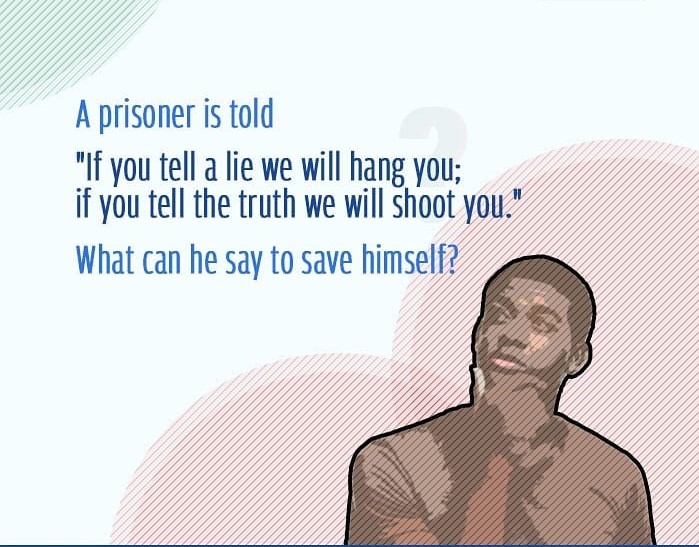Introduction: The Perplexing Dilemma
Imagine being a prisoner faced with an impossible choice: “If you tell a lie, we will hang you; if you tell the truth, we will shoot you.” This seemingly impossible scenario is a classic example of a logical paradox designed to test one’s wits and survival instincts. The situation presents a unique challenge where the prisoner’s goal is to avoid both death and hanging. But how can one navigate such a perilous predicament? Let’s dive into this paradox and uncover the ingenious solution.

Understanding the Dilemma
The Core of the Paradox
In this paradox, the prisoner is presented with two contradictory threats. If they lie, they face hanging. If they tell the truth, they face shooting. This creates a self-referential problem where the truth and lies are intertwined in a way that complicates any straightforward answer.
The Logical Approach
To solve this paradox, the prisoner must use logic and clever wording. The key is to provide a response that cannot be classified as either a lie or the truth in the traditional sense.
The Clever Response
A Sentence That Defies Categorization
The solution lies in the prisoner stating: “I will be hanged.” Here’s why this works:
- If the Statement is True: If the statement “I will be hanged” is true, then according to the rules, the prisoner should be shot. But if the prisoner is shot, the statement becomes false, creating a contradiction.
- If the Statement is False: If the statement is false, then the prisoner should be hanged. But if the prisoner is hanged, then the statement becomes true, creating another contradiction.
This paradoxical statement ensures that no matter what action is taken, the conditions of the paradox cannot be met, thus freeing the prisoner from either outcome.
Breaking Down the Paradox
Why It Works
This approach cleverly exploits the rules set forth by the executioners. The prisoner’s statement creates a situation where any action taken will contradict the initial conditions, making it impossible for the executioners to carry out their threats without facing a logical contradiction.
The Psychological Impact
The Executioners’ Dilemma
The beauty of this solution is that it places the executioners in a no-win situation. Faced with a statement that cannot be classified as a lie or the truth, the executioners are left unable to fulfill their threats. This forces them to reconsider their position and potentially let the prisoner go free.
Philosophical Implications
The Nature of Truth and Lies
This paradox highlights the complex relationship between truth, lies, and logic. It demonstrates that sometimes, the boundaries between these concepts can be blurred, leading to intriguing and unexpected outcomes.
Conclusion: A Lesson in Logical Thinking
The prisoner’s response to the paradoxical threat showcases the power of logical thinking and the ability to navigate complex scenarios with ingenuity. By crafting a statement that defies simple classification as true or false, the prisoner effectively outsmarts the executioners and avoids both hanging and shooting.
This paradox is more than just a riddle; it serves as a reminder of the importance of critical thinking and the ability to challenge conventional rules. It encourages us to think outside the box and approach problems from unique angles, proving that sometimes the most effective solutions are those that defy traditional expectations.





